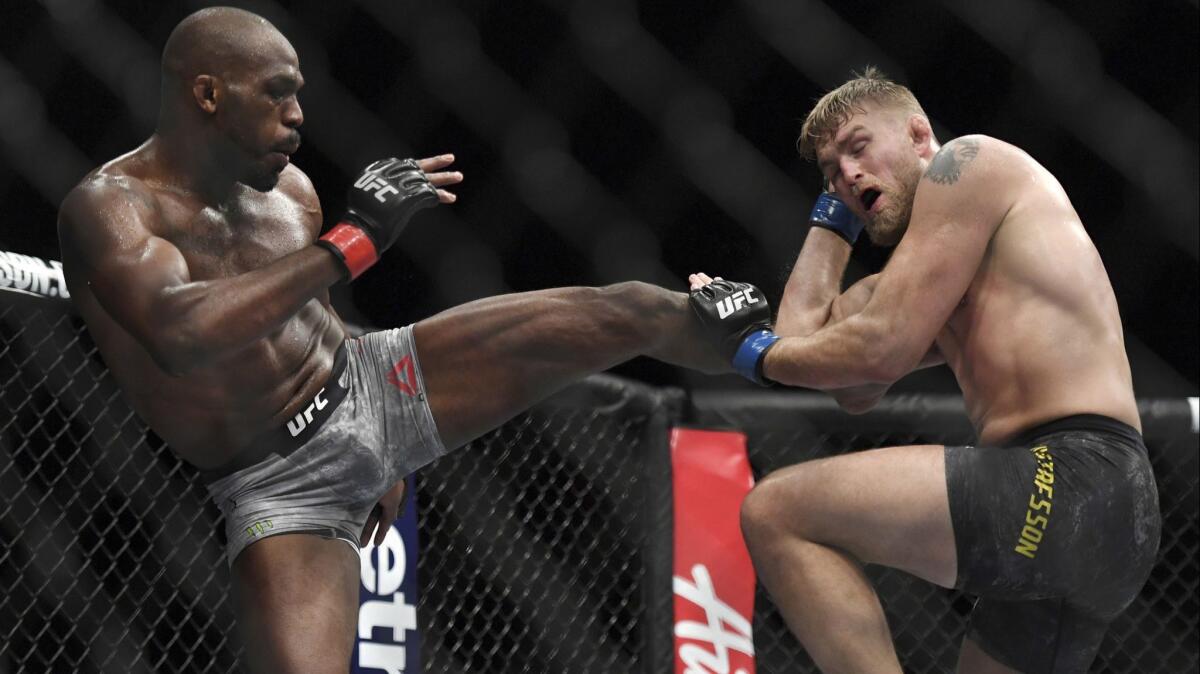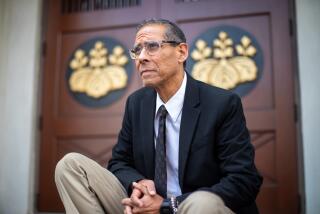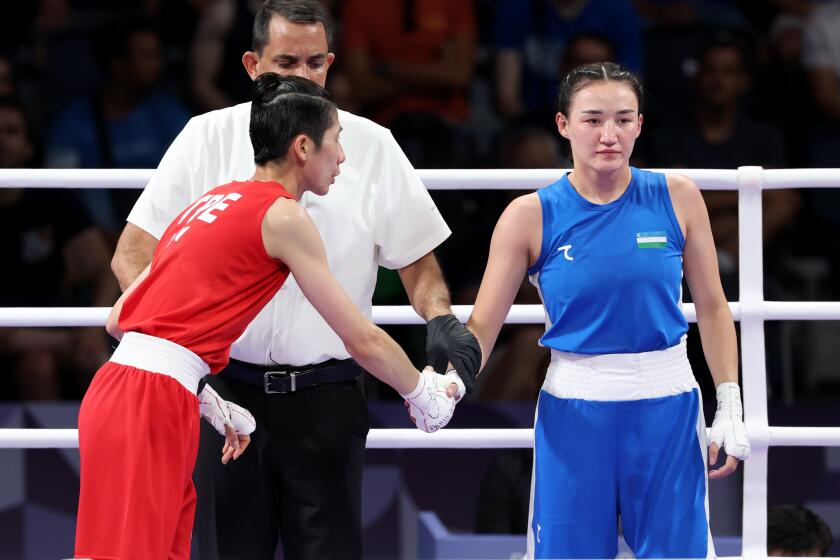UFC champion Jon Jones says he’s ready again to show his dominance

When Jon Jones fought in April 2014 for the third time in a calendar year, he appeared to be at age 26 on a path to superiority over any other UFC talent. He defeated Grover Teixeira by unanimous decision to retain the light-heavyweight title.
The five years since then, however, have featured only three other official fights for Jones, whose days have been shadowed by illicit drug use, positive performance-enhancing drug tests, court appearances and extended sessions in front of state athletic commissions.
“Every champion has his own stories, and mine have been difficult,” Jones reflected in an interview with the Los Angeles Times. “I’ve definitely made things harder on myself. But whether the adversity is self-inflicted or not, I’m just here for the challenge.”
In preparing for a light-heavyweight title defense against No. 3-rated contender Anthony Smith at UFC 235 on Saturday in Las Vegas, Jones said his aim is to fulfill the promise of yesteryear by one-upping the activity of his peak and taking on four bouts between last December and the next one.
“I want to make up for lost time,” Jones said.
He spoke on a bright, brisk Southern California afternoon following the series of storms that soaked and darkened the area for several days before — a metaphor he grasped in taking account of his own tribulations.
“I don’t know if you’ll lose readers by letting me talk about this or not, but it was God” who provided Jones the most comfort following the summer weeks of 2017, when his 55-year-old mother, Camille, died from complications of diabetes.
Jones then submitted a positive test for the steroid turinabol following a victory over heavyweight champion Daniel Cormier in July 2017 that threatened to trigger a four-year suspension and likely end his time as a championship-level fighter.
“It was more crying than it was praying. It was my rock bottom, and you know … there’s nothing you can really say. You’ve just got to let go, believe in his strength and believe that the sun will shine the next day — that a day like this is still possible.
Sign up for our daily sports newsletter »
“I just needed to stay strong and let it all happen … it took a lot of strength. Today, I stand here knowing no man can hit me as hard as life hit me.”
A hearing by the California State Athletic Commission revealed the amount of the steroid turinabol in Jones’ system was scant enough to give credence to Jones’ argument that the ingestion was accidental.
The state changed the victory over Cormier to a no-contest, fined Jones more than $200,000 and suspended him. He returned to reclaim his light-heavyweight belt on Dec. 29, 2018, with a third-round technical knockout of Alexander Gustafsson at the Forum.
“I fought at my best and it showed that these five years – even with all this controversy — haven’t broke me,” Jones (23-1) said of convincingly defeating Gustafsson.
“Not only did it not break me, but I progressed tremendously even through all of my struggles and my pain. That feels good. It’s rewarding to feel that you’re getting better as you get older, as you get more experience and have been through so much. It lets me know adversity is nothing — that it’s actually made me stronger.”
The Nevada Athletic Commission granted him a conditional one-fight license that requires drug screening by the U.S. Anti-Doping Agency, the Voluntary Anti-Doping Assn. and the Nevada commission.
Jones has submitted to at least five tests since his Forum fight, said Andy Foster, executive officer of the California Athletic Commission.
A Feb. 18 sample did not find any existence of turinabol, Foster said.
“I’m grateful to have my job back,” Jones said. “I have nothing to hide. I’ve never taken a day off from the drug pool. I’m always open to being drug tested by the appropriate agency at the given time.”
Recouping the lost earnings from being stripped of his belt in 2015 and suspended in each of the next two years is also part of the strategy to fight more frequently, Jones said.
“I didn’t really have any guilt at all. I’ve never really done anything wrong. I know from the outside looking in, it’s, ‘There’s Jon messing up again’ … but [the positive PED results] were really something I couldn’t control,” Jones said. “I learned not to act like a guilty person if you’re not guilty.
“Just take it on the chin and deal with it.”
He absorbed criticism from Cormier and others on social media who’ve labeled him a “junkie” and worse.
“I set out to be the best fighter ever, and I’m trying to achieve something that is very different and very special,” Jones said. “I’m working toward a future. To do what I’m supposed to do is not supposed to be simple.”
Jones bypassed a question about where he ranks himself against former two-division champion Georges St-Pierre, who retired last week. St-Pierre had criticized the UFC’s absence of Olympic-style drug testing before the company finally aligned with USADA after Jones tested positive for cocaine in 2015.
Jones said he feels entitled after defeating Cormier “twice” — although the second was the no-contest — to fight for a third time in the division of his choice, light-heavyweight, and not Cormier’s at heavyweight.
“If the fans want to see it [at heavyweight] bad enough, the UFC will make it happen for me financially,” Jones said. “If they don’t, it will always be something that’s coulda-shoulda-woulda. Sending me against one of the best fighters ever, and making me sacrifice being smaller than him, they have to make it make sense financially.
“Because, at 2-0 against him, I have nothing to prove. The pressure’s on Daniel. I’m the GOAT of this generation. He knows it. And the fans know that.”
Twitter: @latimespugmire
More to Read
Go beyond the scoreboard
Get the latest on L.A.'s teams in the daily Sports Report newsletter.
You may occasionally receive promotional content from the Los Angeles Times.











